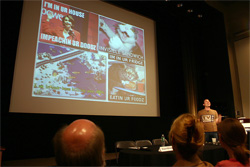FOE: Joshua Green's "Viscerality and Convergence Culture"
The talk, inspired by a walk in the rain with his iPod, was fueled by an anecdote Joshua shared with the readers. New to MIT and the country, Joshua spent most of his life in Australia. Now, all that he brought of himself, in many ways, was that iPod. "I'm not a music person before, but now I care about it," he said. "I suck it in now and feel passionate in a way that I didn't before." He points out that, by moving to America for this job, he has left a phase of his life he cannot necessarily return to. "None of my things are there anymore, and that's not a life I can go back to. The place it does exist in now is in my iPod. I no longer have a home in Australia, just a room at my parents' house backed with boxes. And it's not the iPod, but that's the only thing I can pack my social existence into."
He points to a quote about the Zune in which it was called a "software experience." He says, "The sharing that the Zune enables requires you to play by its rules. And, in the conversion environment at the present moment, we don't play by technology's rules. We bash, smash, and hit technology until it plays by our rules." And that's where he sees the distinction between the Zune and the iPod. It's the difference in relationship that's perceived about being about software and one that is about social relations. He points out that his relationship with his iPod and MacBook Pro feels like a relationship because it feels social. "It is a device for sharing culture. The way in which I utilize this device is one to facilitate sharing culture."
On the other hand, he doesn't completely buy into iCult, and he makes the point that these opening remarks are not intended to be a celebration of the brand without reservations. "I enjoy my relationship with this machine more than the other Toshiba box I had before, but iTunes has DRM and now they've cornered the market." He said that it's not the technology but the social interaction that it enables and encourages. He says that these types of social interactions is what companies are starting to get, and he points to Comedy Central's recent assurances at not taking all Comedy Central clips off YouTube as an example.
He points to examples from various Internets as his example of how the technology is used as social relationships. In making fun of the Ted Stevens "tubes" reference to the Internet, Joshua points to the user-generated responses to his idea of tubes. One was very scientific, the type of industrial containers you would see around MIT with those danger hazardous stickers on them. The other model is Fallopian tubes. Hedescribed the top one as being about technology, while the ladder is about organicness and squishiness. He asserts that the increasing acceptance of identity politics and the politics traditionally ascribed to a female domain in consumerism and fandom, etc., makes the Fallopian tubes of the Internet perhaps a better analogy.
In addition to this discussion about tactile relationships and viscerality, Joshua discussed the distinction between impressions and expressions. Impressions, as the old model, is when we send messages out that leave impressions on to users that prompt them to do something. When you understand tactile relationships, though, Joshua said that you encourage audiences to speak in some way. "When the product is transformed from commodity to culture, though, you have to cede control because it's no longer yours," he said, "but it's okay."
However, Joshua's presentation was very visual in nature, very visceral as the very title implies, so the video will be essential when it is made available for viewing over the next few days. Check back here and at The Futures of Entertainment site for more information. Also, see Rachel Clarke's notes on Joshua's presentation at Licence to Kill. Also, Kent Quirk has his take of Joshua's presentation at Global Warming Can Be Fun. Finally, you can see Erica George's notes at Writing in Clay.
Also, see a recent post and discussion here on the Zune's release.
